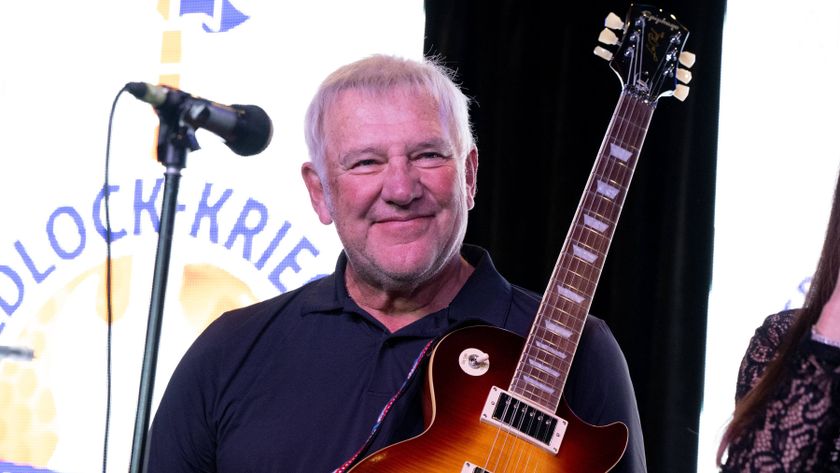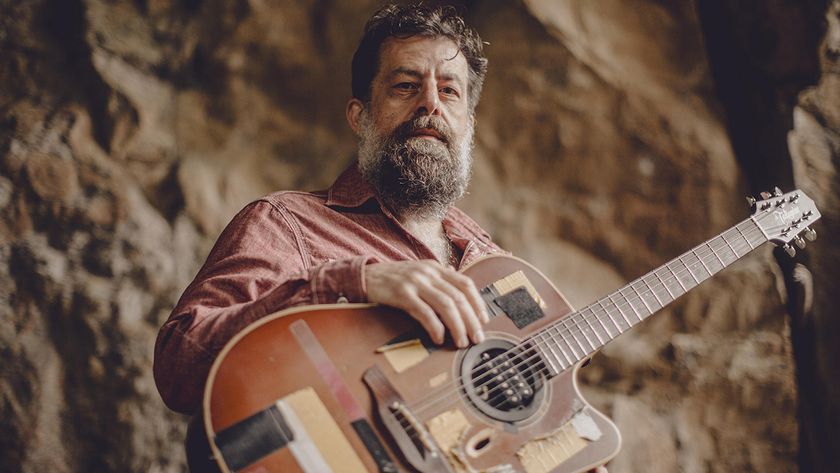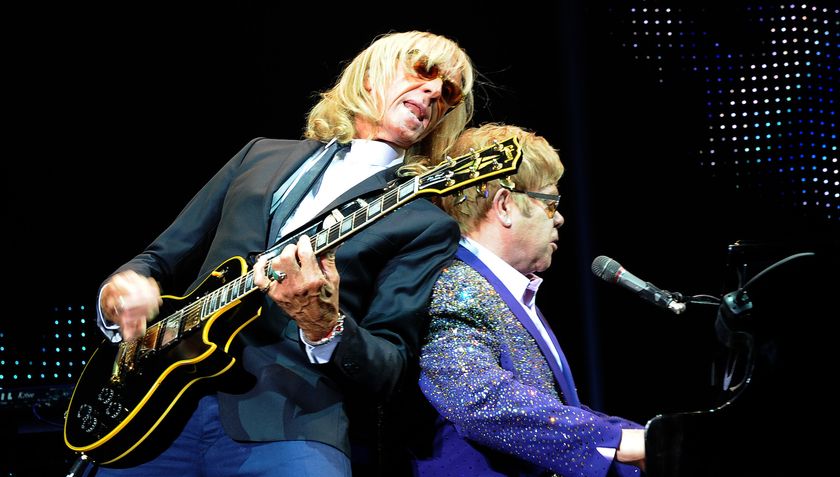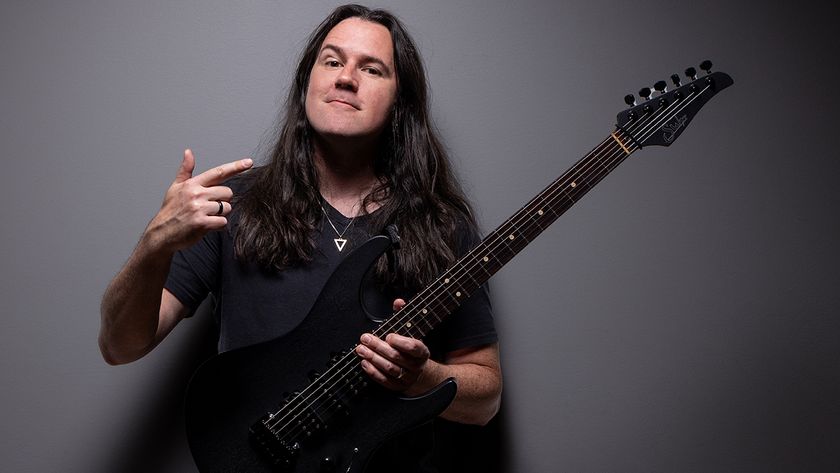Tony Iommi and James Hetfield discuss their guitar journeys with Black Sabbath and Metallica in this classic 1992 Guitar World interview
The titanic pair on gear, influences, being heavy metal pioneers, setting bandmates on fire and everything in between

This archive interview with Tony Iommi of Black Sabbath and James Hetfield of Metallica first appeared in the August 1992 issue of Guitar World.
Tony Iommi and James Hetfield arrive decked out in black. No one seems particularly surprised by their matching color scheme. In fact, it would be cause for concern if they didn't look like twin executioners. Black, after all, is the official color of heavy metal royalty – and these are the kings of kings.
Despite their similar attire, Iommi and Hetfield's demeanors provide sharp studies in contrast. Iommi, with his dark eyes, meticulously groomed moustache and soft English accent, has the dignified bearing of a British noble man.
The blond, gravel-voiced, sharp-tongued Hetfield, on the other hand, has the guarded, hulking aspect of an urban street-fighting man.
James's gruff exterior, however, disintegrates in a puff of worshipful smoke as soon as he greets Black Sabbath's legendary guitarist, who had arrived just moments earlier.
“It's a pleasure to finally meet you, man,” Hetfield says with genuine enthusiasm. Iommi is quick to respond with a volley of compliments.
“My son bought me your last album, and it's one of the first recordings I've received in a long time that I can praise without reservation. I listen to it in my car all the time.”
Get The Pick Newsletter
All the latest guitar news, interviews, lessons, reviews, deals and more, direct to your inbox!
Hetfield beams at these unqualified words of approval from hard rock's original god of thunder. As leader of Black Sabbath, Iommi pioneered an entire school of dense, ominous, highly amplified music, which eventually became known as heavy metal.
Though many guitarists explored power chords and distorted guitars in the psychedelic '60s, Iommi was the first guitarist to make these musical elements a personal obsession.
The original Sabbath lineup – Iommi, singer Ozzy Osbourne, bassist Geezer Butler and drummer Bill Ward – first coalesced in 1968 as Earth, playing pop and blues. The following year the group discovered volume, overdrive and paranoia, and celebrated their find by adopting the sinister Sabbath moniker.
Shortly thereafter, the band released Black Sabbath, the first of its series of hell-raising masterpieces on Warner Brothers. Paranoid (1970), Master Of Reality (1971), Sabbath Bloody Sabbath (1975) and Heaven And Hell (1980), with replacement vocalist Ronnie James Dio, following in fiendish succession.
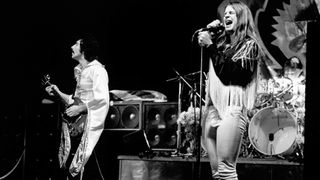
Although their music was despised by critics and ignored by radio programmers, the band's special brand of doom and gloom sold millions of records. Iommi's radically detuned Gibson SG and his inventive soloing became the major source of inspiration for such guitarists as Eddie Van Halen, Kim Thayil and, of course, the young James Hetfield, who went on to co-found the modern-day rock juggernaut, Metallica.
“I discovered Black Sabbath by digging through my older brother's record collection,” recalls Hetfield. “Their album covers really drew me in. I immediately thought, ‘I gotta out this one.’ And when I did, I couldn't believe it. It was like, ‘Whoa! Heavy as shit.’ Sabbath was everything that the '60s weren't.
“Their music was so cool because it was completely anti-hippie. I hated The Beatles, Jethro Tull, Love and all that other happy shit.”
Though Black Sabbath has through the years had its ups and downs and endured numerous traumatic personnel changes, Iommi and company are back, stronger than ever, with Dehumanizer.
The album features a fresh lineup that includes Dio, Butler and veteran drummer Vinny Appice. “if you like songs like War Pigs, then you'll like this one,” says Iommi. “There are a lot of heavy riffs, and it's real raunchy.”
The invocation of the very appropriate terms “real” and “raunchy” is a good place to turn to our historic interview with guitar sorcerer Tony Iommi and his second-generation apprentice, James Hetfield.
We convened in the booth of a seedy Manhattan bar, where the jaded clientele remained oblivious to the presence, in a secluded rear booth, of two of rock and roll's greatest heavyweights.
The reactions to our music were very strong, both pro and con. But I think most people enjoyed what we were doing, because they never heard anything like it
Tony Iommi
Tony, what were your earliest influences?
Iommi: “In the beginning I was primarily influenced by old blues records. Since liner notes on most blues 78s were either sketchy or non-existent, I never knew who half of the musicians were. I still don't.”
What was your first band like?
Iommi: “There were six of us: the four original members of Black Sabbath plus a sax player and a slide guitar player.
Hetfield: “Was that Earth?
Iommi: “That was before Earth. I think we called ourselves the Pop Top Blues Band, or something equally stupid. We eventually broke up so we could get rid of the sax and slide player. The four of us wanted to move away from the blues thing.
But how did you make the jump from playing traditional blues to composing the heavy, riff-oriented music that characterized Sabbath?
Iommi: “Well, to be honest, we just became so fed up with people talking while we were playing that we said, ‘Screw it, let's turn it up, so they won't be able to chatter. [laughs]”
The band just kept getting louder and louder. Did you new sound provoke an immediate reaction from the audience?
Iommi: “Yeah. After we wrote Wicked World and Black Sabbath, we thought, ‘Well, we're going to have to try them out.’ Everybody in the club just froze! We had all these blues people saying, ‘What's that?’ The reactions were very strong, both pro and con. But I think most people enjoyed what we were doing because they never heard anything like it.”
Hetfield: “Didn't you guys play Blue Suede Shoes for a while?
Iommi: “Oh, you know that? We were getting ready to perform on a British television show, and played Blue Suede Shoes during sound check. Ozzy didn't even know the words. He was just goofing around while they worked on the camera angles and whatnot. So they said, ‘Play something,’ and we just played that.
“Somehow it got bootlegged. I'm afraid out version is obscenely bad – no one should be subjected to it. [laughs]”
James, how did Metallica come to pioneer thrash metal?
Hetfield: “Like Tony, we also played cover tunes when we first started. We were really influenced by the New Wave Of British Heavy Metal, which included bands like Venom and Diamond Head – underground stuff.”

“We learned a bunch of their songs from a batch of obscure singles that Lars had collected. Most people thought we were performing originals, because they had never heard any of the shit before – which was good for us! We took all the credit. You know: ‘Hey, you guys write good songs,’ ‘Yeah, I know.’ [laughs].
“We certainly weren't going to tell them the truth. Eventually we started playing everything faster, because, just like with Sabbath, the crowd wasn't paying attention to us and that pissed us off.
“In LA, people were just there to drink and see who's there and shit. We decided to try to wake everybody up by playing faster and louder than anybody else.
“Nervousness also contributed to our sound. Lars was always nervous on stage, so he'd play faster and faster. That was a huge challenge for us, but nobody wanted to wimp out and tell him that he was playing too fast. We just figured, ‘Hell, we'll just play fast, too.’”
Did you ever play any Sabbath tunes?
Hetfield: “Not in Metallica, but I did in high school. I'd play Sabbath, Thin Lizzy and some of the heavier stuff at parties.”
Tony, in the early days of Sabbath, did you ever feel like you were competing with bands like Deep Purple and Led Zeppelin?
Iommi: “Certainly. There was always competition between Zeppelin, Purple and ourselves. In fact, Robert Plant and John Bonham were from Birmingham, which was out hometown. We all knew each other, which made it worse.”
Did you ever jam with Plant or Bonham?
Iommi: “Bonham got up and played with us a few times. In fact, he was my best man when I got married. The main thing I remember about John was that he was in an incredible number of groups. He'd only be in them for a week, and they'd get rid of him because he was too loud.
“He had this tremendous list of bands that he'd played with written on his bass drum case.”
Was it hard to play in a tough factory town like Birmingham?
We were completely surrounded by violence and pollution, so that was a big part of our music. We were living our music
Tony Iommi
Iommi: “it had an effect on us. We were completely surrounded by violence and pollution, so that was a big part of our music. We were living our music.”
Weren't you and Ozzy Osborne actually in different street gangs?
Iommi: “Yeah, I used to hate the sight of Ozzy. I couldn't stand him, and I used to beat him up whenever I saw him. We just didn't get on at school. He was a little punk. It's pretty amazing that he eventually became part of Sabbath.
“Bill and I were looking for a singer, and we spotted this advert that said, ‘Singer looking for a gig. Call Ozzy at...’ I said to Bill, ‘I know an Ozzy. It can't possibly be that one.’
“So we went to the address listed in the ad, and knocked on the door. Sure enough, Ozzy appeared. I said to Bill, ‘Forget it, forget it.’ But Bill wanted to chat with him.
“We talked, but when we left I said, ‘No way, Bill, I know him.’ Three weeks later, we ended up together anyway. Life moves in mysterious ways.”
Tony, what's your craziest Ozzy Osbourne story?
Iommi: “I don't know – there's so many. Wait, here's one. Actually, it's quite funny. We were all in an elevator in this real plush hotel, and Ozzy decides to take a crap. As he's doing it, the elevator is going down to the reception floor. The door opens suddenly – and there's Ozzy with his pants around his knees. And all these people in fur coats are just staring at him with their mouths open.”
Hetfield: “I heard one story – I don't know if this is true – that Bill Ward showed up to go on tour one time with his only suitcase filled with beer.
Iommi: “Well, Bill never used to take many clothes at all. And when he did, he'd have two suitcases: one with dirty clothes, and one with dirtier clothes.”
Hetfield: “And tights?”
Iommi: “Oh yeah, he always had his red tights.”
Hetfield: “What did you think of his tights?
Iommi: “Bill was a character! He was voted the scruffiest, most untidy drummer in England. Considering the competition, that was quite an achievement! But it was Bill. He was our outlet, the one everybody picked on. I used to do terrible things to him. I actually set him on fire once – honest to God.
“We were recording Heaven And Hell, and I asked, ‘Can I set you on fire, Bill?’ And he said, ‘Well, not now, not now.’ So I said, ‘Okay,’ and then forgot all about it. An hour later Bill said, ‘Well, I'm going home now. Do you still want to burn me, or what?’ I said, ‘Sure.’
“So I got this bottle of petrol, tipped it on Bill, set fire to him and – voomph. I couldn't believe it! He went up like a Christmas tree. Well, he knew I was going to burn him, but he didn't know to what extent.
“He screamed and started rolling around on the floor. His clothes started burning and his socks melted – the nylon socks stuck to his leg. I wasn't able to help him because I couldn't stop laughing.
“It was actually pretty serious; he had to go to the hospital. I felt really bad. He had third-degree burns on his arms and legs and everywhere. The next day his mother phoned me up and said, ‘You balmy bastard. It's about time you grew up. Our Bill is going to have to have his leg off.’
“She exaggerated a bit, but things like that were a regular occurrence with Bill.”
James, many bands have modeled themselves after Metallica. How does that make you feel?
Hetfield: “It's like being bootlegged. You can't get mad about it, because there is nothing you can do. In a way, it's very complimentary. It's pretty flattering to think that people are taking the time to copy my style. When they get really close to ripping off actual riffs or parts of songs, that's when you have call them up and say, ‘Hey, what the hell are you doing?’ [laughs]
“Actually, me and my buddy Bob were talking last night about how bands have gotten really competitive lately. I think it has a lot to do with last summer's Clash of the Titans tour. I didn't like the fact that Megadeth, Anthrax and Slayer were talking shit.
“Before, the attitude was more like, ‘Come on, buddy, let's jam.’ We were fighting for the same cause – getting our music heard. There doesn't seem to be any unity anymore. It's just too damn bad.”
Iommi: “It was really much the same in the early '70s with us and Deep Purple. We were really concerned about who was going to sell more records or chart higher. And you'd say to yourself, ‘I hope they don't.’”
Hetfield: “What kind of amps have you used through the years?”
Iommi: “I used Laneys for years.”
Hetfield: “What did you use for distortion?”
Iommi: “Basically, I just used a little box called a Rangemaster, which boosted the input. Now they build that directly into amps, don't they? Believe it or not, I went to several companies 20 years ago and said, ‘Can you build this in an amp?’
“They all said, ‘Don't be stupid, nobody's going to want to buy something that distorts an amplifier.’ I said, ‘Of course they will. If they like that sound, they'll buy them. If they don't, they'll buy your ordinary one.’ And it took them 15 years before they realized what I was saying. In fact, Laney came to me later and said, ‘Now we know what you were talking about.’”
Hetfield: “How did you come to use a Gibson SG?”
Iommi: “I played a Fender Stratocaster up until the first album. Then, just as we were getting ready to go into the studio, one of the Strat pickups blew. I thought, ‘What am I going to do?’ As luck would have it, I had an SG laying around. I'd bought it as a spare, but never played it.
The big problem with being the only guitar is that you have to work hard to keep the bottom from falling out. I tried all sorts of things, like I'd create rhythm parts that would allow the low E string to ring as much as possible
Tony Iommi
“At first I was frightened, thinking, ‘God, I'm going to have to use this one now, and I've never played it.’ But it worked out fine, and I've used it ever since.”
Hetfield: “Same thing happened to me. I was playing a Flying V all the time, and one day the headstock broke. I had an Explorer as a backup guitar, and it just felt right.”
Tony, didn't you replace one of the SG's pickups?
Iommi: “Yeah. Over the years I've tried to get various guitar companies to get involved with me, but none of them really worked out. So I put the money up and bought my own guitar company. I hired a fellow named John Birch to design whatever I needed. John, incidentally, made my first 24-fret guitar. I had approached Gibson, and they said, ‘We can't make a 24-fret instrument, we're not interested.’
As soon as they said ‘can't,’ I said, ‘That's it, I'm going to do it.’ So I got John, who was a bit of an eccentric, and he said, ‘I'll have a go at that.’ So he made this guitar, which I've still got at home. Next I said, ‘This is great! Now we've got to design our own pickup.’
“So we went through a period of trying different pickups. John would wind each one differently. And when we found a pickup we really liked, we'd make a few that were very similar. They were never exactly the same, but similar.”
James, were you ever interested in custom instruments?
Hetfield: “Never.”
Iommi: “The only reason I got involved in guitar-making was because there were few alternatives to the mainstream companies. Now there are lots of guitar companies, pickups, effects and gadgets to choose from. In the '70s, there was nothing.”
Hetfield: “Do you down-pick most of your rhythm parts?”
Iommi: “Yeah, they sound heavier that way. The big problem with being the only guitar is that you have to work hard to keep the bottom from falling out. I tried all sorts of things, like I'd create rhythm parts that would allow the low E string to ring as much as possible. And Geezer played an eight-string bass, which helped for a while.”
Although many people credit Eddie Van Halen, you were actually one of the first guitarists to detune to an Eb, which helped create your signature dark sound.
“People would always tell me, ‘You can't lower the pitch of your strings, that's not right.’ I actually used several different tunings. I would try anything. Occasionally, I'd tune as much as three semitones down for Ozzy, because he couldn't hit certain notes.”
![[L-R] Tony Iommi and James Hetfield](https://cdn.mos.cms.futurecdn.net/f24y37E7kW3sLCDvvwFjrb-320-80.jpg)
Hetfield: “Wow! So you tuned down to a C sharp or something?”
Iommi: “We'd try anything to make our sound heavier.”
Hetfield: “Wasn't it hard to stay in tune, especially since you use .008's?”
Iommi: “It was. Particularly with my Gibson, because the neck would shift.”
Hetfield: “On the other hand, the combination of light strings and detuning must've made it easy for you to bend strings and apply vibrato.”
Iommi: “Actually, I had to use light strings. I had a work-related accident in the early '60s that cut off the tips of my fingers. As a result, I can't bend heavier strings. I can't even feel the strings. [Shows his amputated fingers.] See, this one's cut off, and that one's gone off that way.”
Hetfield: “[visibly shaken] Wow!”
Iommi: “Suddenly, I had to develop a new way of playing. Ironically, I had the accident on the same day that I was supposed to quit my factory job to tour Germany with this group. So when I started playing again, I had to devise a new way. I used to play a lot with my forefinger and pinky because the two middle fingers were bandaged up. I learned to use and bend with my little finger a lot.”
Hetfield: “You never tried using your right hand?”
Iommi: “Well, I tried, but it was too difficult – I was too impatient to try playing the other way: I just couldn't get the hang of it. As you can imagine, I had to learn to play standard chords in very unorthodox ways. Then I created these plastic thimbles that extended the length of my fingers, which allowed me to play in a normal fashion.”
Hetfield: “Why do you need the thimbles? Why can't you just use your shortened fingers?”
Iommi: “There's only one layer of skin that covers the bone. Sometimes when I'm playing with the thimbles and they come off – sshhh!”
Me and Kirk are a weird pair. We're not as close as two guitar players in a band usually are
James Hetfield
Hetfield: “Ouch! So basically, the accident indirectly led you to develop this completely unique style.”
Iommi: “Yeah. I thought I was finished, because I went to different specialists and they all said, ‘Forget it.’ Then a friend of mine bought me a record by jazz guitarist Django Reinhardt and told me to have a listen.
“I said, ‘He's really good.’ Then he told me that Django was able to use only two fingers. It started me to thinking, ‘Well, he was able to do it. I'm gonna have a go at this.’ And that's what sort of started me on the way again.”
Hetfield: “Did you ever think it would be cool to have another guitar player in the band?”
Iommi: “I wouldn't mind it now, but my first experience with the slide player I mentioned earlier was so bad that it left a sour taste in my mouth. He was louder than me, and I felt like we were constantly competing with each other. Actually, Queen's Brian May has played with us.”
Hetfield: “Oh, really?”
Iommi: “He's the only other guitarist I've really played with. We've done a lot together over the years, and I've really enjoyed it.”
James, it must be nice to have another guitar player in the band. Does Kirk offer suggestions when you get stuck for ideas?
Hetfield: “We're a weird pair. We're not as close as two guitar players in a band usually are. We know our limits with each other. He plays the solos. He can play solos and I can't. Actually, I can solo, but I tend to play your standard boxy, blues shit, which I dig.
“I play all the rhythm tracks, and most of the main melodic lines, and Kirk just comes in and does the solos.”
Tony, what were your main responsibilities in Sabbath?
Iommi: “I usually wrote the riffs and Geezer wrote the words. We credited everybody because we didn't want to create any competition or ill-will in the band. We wanted everyone to share in the band's success equally. It went on like that for years until Ronnie came in.
“Unfortunately, my role began to grow. It just became accepted that I was responsible for booking the studios, producing the record, organizing everybody's life. It got pretty out of control.”
Hetfield: “So you had a major role in producing Sabbath.”
Iommi: “Yeah, but I wasn't really thrilled with the responsibility. The band would come to me and say: ‘We need a studio. Well, you know about it – which one should we get?’ And then they would say, ‘We don't want any outside people coming in. We'll do it ourselves.’ And ‘ourselves’ always ended up meaning me.
“I didn't mind it at first. In fact, I enjoyed it to a point. But it's hard when you start getting too bogged down. All I wanted to do was play and be part of the band. I didn't necessarily want to sit at a mixing board all night. Ultimately, though, it's probably better to do it yourself than leave it up to a stranger.”

James, how does Metallica function?
Hetfield: “We have two people trying to run the band – me and Lars – so we're arguing all the time. The other guys are just like, ‘Whatever, just put the thing out.’ Sometimes I think it would be a hell of a lot easier if there was just one of us, but we're a little too stubborn for that.”
The latest Metallica record sounds great. It's a classic example of a band working well with an outside producer.
Hetfield: “It worked well because the roles were made very clear. We brought Bob Rock in to create a great-sounding record, but we didn't want him messing with our songs. We wanted Bob to take care of the engineering so we could get a little looser with the songs.
“Still, Lars and I had a real difficult time staying out of his hair. Bob definitely got ruffled quite a few times, but I think he'd do it again.”
Tony, are you meticulous in the studio?
Iommi: “Well, the first album went really quickly.”
Hetfield: “Yeah, same with us. Our first album was recorded in no time. We had rehearsed all the songs a million times. And played them live a trillion times.”
Is it true that the first Black Sabbath album was recorded in only eight hours?
Iommi: “Yes. On an eight-track machine.”
Hetfield: “You beat us!”
Iommi: “And the next album, Paranoid, was done in only a few days. That was a long time for us; we didn't know anything about studios. Having three or four days to do an album was a complete luxury. But it got worse. The longer we had, the longer it took. The more success you have, the more you start fussing over details, and it takes longer and longer.”
Hetfield: “If you don't try everything, it's like, ‘We could've done that!’ It's better to regret doing it than not doing it.”
Iommi: “We also became very lazy and self-indulgent. We'd record in Miami or LA, and everybody'd be down on the beach. ‘Should we go in today?’ ‘No, definitely not. We'll go in tomorrow.’ It got like that. And then you end up taking six months, and you're not really doing anything apart from telling jokes. We fell into that trap a few times.”
One time the church managed to stop us from playing. And the next day the church, for some reason, burned down. And guess who got the blame? The uproar was ridiculous!
Tony, when guitarists began using speed-picking and tapping, did you feel any pressure to keep up with the times?
Iommi: “I felt that was good for them, but not for me. I'm not that sort of guitarist – I'm from the old school. I think if I started doing it, it would sound corny.”
What can we expect from the new Sabbath album, Dehumanizer?
Iommi: “It's a cross between the first album and Heaven And Hell. It's got more guts than a lot of our recent stuff had. I really felt I lost it for the last few years as we went into a slightly different field. But having Geezer and Ronnie back has brought it all back again. It feels good.”
What are you recording with now?
Iommi: “A small Marshall – a little 50-watt combo Jubilee series pumped through a 4x12 cabinet. It sounds great.”
And what guitar are you using?
Iommi: “The Birch SG.”
Why do you think Black Sabbath became a punching bag for the critics? Millions of people loved you.
Iommi: “Millions of people hated us as well. Probably more hated us. A lot of journalists literally hated the sight of us. And it was pretty unusual, really. I think we were the band to pick on from day one, because we'd gone against all the things we were supposed to be.
“Everybody picked on us because we were ‘Satanic.’ The Church went against us in a big way.”
Hetfield: “Did you ever have to cancel any gigs because of protesters?”
Iommi: “Well, the Church stopped a few gigs from happening. One case was quite funny, I thought. A church ran a thing in the papers for weeks before a scheduled performance saying, 'If you let these lads into town you're committing a sin.'
“Anyway, they managed to stop us from playing. And the next day the church, for some reason, burned down. [laughs] And guess who got the blame? The uproar was ridiculous!
“We get it from the other side too. One night, after finishing a show, we returned to the hotel and found the corridor leading to our rooms completely filled with people wearing black cloaks, sitting on the floor with candles in their hands, chanting, ‘Ahhhh.’
“So we climbed over them to get to our rooms, but could still hear them chanting. We called security, but that didn't work. So we synchronized our watches, opened our doors at the same time, blew the candles out and sang Happy Birthday to them. Pissed 'em off.
“They freaked – they were expecting us to help them conduct a Satanic mass and they got Happy Birthday instead.
“A worse incident happened in California. When we arrived at the gig, there was a red cross painted on our dressing room door, so we figured, ‘This must be the room!’ [laughs]
“When we were playing, my amp started crackling and I got so pissed off that I walked off the stage. As I was walking off, some guy with a dagger lunged at me and tried to stab me. As it turned out, the cross on the door was written in his blood -- he had cut up his hands. As they dragged him away he called us ‘Satanists!’
Do you ever worry that your music may affect people in a negative way?
Iommi: “There have been bad ones. I think the Son of Sam murders were associated with us, because he recited words from our songs when he killed people. So, of course, we got dragged into that court case.
“In England, a nurse committed suicide, and they found Paranoid on her turntable. They took that into court, and played it to see if there was any possibility that the music drove her to kill herself.
“But, you know, we're used to that. It's been that way since we started.You wouldn't believe some of the letters we've received, and some of the people that have turned up.
“Admittedly, we were involved with the head witch in England, in the early days of the band. He used to come to shows and try to get us to attend his meetings. We checked into some of it out of natural curiosity, but none of us were ever seriously involved with witchcraft or the occult.”
James, are you aware of being a role model?
Hetfield: “Yeah. Interviewers always ask for your opinion about this or that, but I'm just an artist doing what I like to do. If anything, we've been telling the kids to think for themselves.
“People say, ‘You're a role model for these kids so you'd better tell them what to do.’ Hell, no one told me what to do. I hate people telling me what to do!”
Both of you have had to deal with personnel changes in your band. Is that kind of change usually positive or negative?
Hetfield: “It depends on the circumstance, of course. Trying to find someone new when Cliff Burton died was like, ‘Man, this guy better be good.’ We chose Jason because he can write, he's really energetic, and he can down-pick as fast as me. [laughs]
“You never know whether you're making the right choice, but getting new blood sure peps you up.”
Did Jason get any shit in the beginning?
Hetfield: “He still does. He's been in the band longer than Cliff was, yet he's still the new guy – and it won't change until there's another new guy.”
What do you think, Tony? Sabbath has been through many changes.
When Ronnie replaced Ozzy, he definitely injected a lot of positive energy. Ozzy had become predictable. Ronnie had a completely different approach and I think we worked well as a writing team
Tony Iommi
Iommi: “When Ronnie replaced Ozzy, he definitely injected a lot of positive energy. Ozzy had become predictable. Ronnie had a completely different approach and I think we worked well as a writing team. I never sat down to write with Ozzy, which is a shame.”
James, has it been difficult for Metallica to grow together?
Hetfield: “[with an intimidating voice] What are you trying to say? Are you trying to get me to fire people?”
[Turning pale] No, no, no – not at all.
Hetfield: “Don't worry, I know what you're getting at. [laughs]”
Iommi: “My role in the band was to play big brother. If there was a party happening, I wasn't able to go because I had to set an example. I never wanted that role, but somehow I got it. It's a nasty job, but somebody's got to do it.”
Hetfield: “No doubt. We' re pretty open as a band, and we tell each other straight up, ‘That's fucked up.’ We're pretty sarcastic also. We know each other really well – I mean, shit, we basically grew up together.”
Iommi: “We never, ever, had that. We couldn't even exchange riffs. It's only now that Geezer will come to me with riffs and say, ‘What do you think of this?’ ‘Bloody hell, that's great.’ And it's good.
“With our current lineup, we're more at the stage you're at now. We can talk about things, where in the past we weren't able to do that. All the years we've been together, we were never able to say, ‘You're playing crap,’ or, ‘Do this instead of that.’ It's gotten much better.”
Hetfield: “It's got to be honest and open. You're working for the same team. We ain't playing games here. If something's wrong, speak up. And we do yell at each other. We expect a lot from each other. We all know each other's shit. Kirk plays great lead solos, and he's kind of a quiet guy, so he doesn't raise a big stink.
“Jason's nuts on stage, he shines there. Lars talks 100 miles an hour during interviews and likes the business part. I yell at people and buy 'em beers. [laughs] That's what I fucking do!”
Tony, do you ever listen to your old stuff? Do you listen to your albums?
Iommi: “Sure. Occasionally we'll get drunk and think, 'What did we used to sound like?' And we'll put an old album on.”
Hetfield: “I like listening to our old stuff. The other guys in the band will say things like, ‘Oh, I can't listen to this song because of such and such note I played.’ Especially Kirk. I don't do that. I've completely forgotten about things. Either I was drunk or I didn't give a shit.”
You've remarked that Ride the Lightning was your favorite Metallica record. Has Metallica surpassed it?
Hetfield: “Yeah, no doubt. I liked Lightning because of the muscular sound. The other ones were a little thinner – the songs were good, but the production could've been better.”
Iommi: “With every album there are certain bits you like and certain parts you don't like. I think most of our records were good for the time, but you're never satisfied.”
Hetfield: “That's the cool thing, though. If you are satisfied, it's over. You gotta keep going. A guitar sound – it's never perfect.”

“The Strat is the most versatile electric guitar that there is; but the Les Paul is a perfect instrument”: Sting guitarist Dominic Miller weighs in on the Strat vs. Les Paul debate – says the Strat loses despite being a more versatile instrument

“I’m extremely honored. It reminded me that it’s important to stick to my own playing style”: Her fans include Dave Grohl, Jack White and Eddie Vedder, and she’s the face of Fender’s Hello Kitty campaign. Why Yoyoyoshie is Japan’s next great guitar hero
